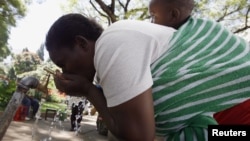HARARE -- Imagine a person without access to clean water since 1962. That describes the situation in one of the poor regions in Zimbabwe. In one village about 85 families do not have any access to clean water, toilets or schools. But their fortunes might change thanks to an unlikely source.
In Pambili village in Tsholotsho, about seven hours drive southwest of Harare, there is no clean water and people practice open defecation. Their children walk miles to get to school, which explains why most of the children have dropped out of school.
“My son, water is a real problem here. Since 1962 [when I started living here] up to this year 2012, this area has not been having any borehole, not even a single one. We drink water which is dirty,” said Philip Madzorera, 72, from Pambili village in Tsholotsho. As he talks, children gather around. This is a school day. But they can’t afford to go to school. Their parents cannot afford to pay fees which are less than $30 a year per child.
But it is a different story in Harare, Zimbabwe’s capital. There, toilets and taps have running water.
Ignatius Chombo, the minister of urban and rural development, has an answer as to why some Zimbabweans still depend on water from rivers for daily use and lack any type of modern sewage system.
“The history of colonialism in Zimbabwe is not new. We were under colonial bondage until the year 1980. That means for the last 100 years the economy was favoring or only catering for those in the urban areas and white elites. So there was nothing that was done by the former colonizers we can talk about. If anything, you tell me,” said Chombo.
That has become a norm for many Zimbabwe government officials: blaming the country's former colonizers for the ills the country is facing today, more than 32 years after Great Britain brought down the Union Jack in Harare.
Chombo, the minister of urban and rural development, was in the Tsholotsho area together with Zimbabwean Prime Minister Morgan Tsvangirai, meeting with officials from the U.N. Children's Fund.
The United Nations agency sourced a $50 million grant from the British Department for International Development (DFID) to drill boreholes looking for water.
Dave Fish, the head of DFID in Zimbabwe, said there was no basis to blame London for the issues the African nation was facing at the moment.
"I am not here to apologize for what happened in history. But it is really important for this country [to] look forward and does not try [to] blame the current problems on history. There is a lot to be done in this country," he said.
That "lot to be done" includes ensuring that close to three million Zimbabweans have access to clean water and have at least pit latrines so that they do not relieve themselves in the open as is the case in Tsholotsho.
In Pambili village in Tsholotsho, about seven hours drive southwest of Harare, there is no clean water and people practice open defecation. Their children walk miles to get to school, which explains why most of the children have dropped out of school.
“My son, water is a real problem here. Since 1962 [when I started living here] up to this year 2012, this area has not been having any borehole, not even a single one. We drink water which is dirty,” said Philip Madzorera, 72, from Pambili village in Tsholotsho. As he talks, children gather around. This is a school day. But they can’t afford to go to school. Their parents cannot afford to pay fees which are less than $30 a year per child.
But it is a different story in Harare, Zimbabwe’s capital. There, toilets and taps have running water.
Ignatius Chombo, the minister of urban and rural development, has an answer as to why some Zimbabweans still depend on water from rivers for daily use and lack any type of modern sewage system.
“The history of colonialism in Zimbabwe is not new. We were under colonial bondage until the year 1980. That means for the last 100 years the economy was favoring or only catering for those in the urban areas and white elites. So there was nothing that was done by the former colonizers we can talk about. If anything, you tell me,” said Chombo.
That has become a norm for many Zimbabwe government officials: blaming the country's former colonizers for the ills the country is facing today, more than 32 years after Great Britain brought down the Union Jack in Harare.
Chombo, the minister of urban and rural development, was in the Tsholotsho area together with Zimbabwean Prime Minister Morgan Tsvangirai, meeting with officials from the U.N. Children's Fund.
The United Nations agency sourced a $50 million grant from the British Department for International Development (DFID) to drill boreholes looking for water.
Dave Fish, the head of DFID in Zimbabwe, said there was no basis to blame London for the issues the African nation was facing at the moment.
"I am not here to apologize for what happened in history. But it is really important for this country [to] look forward and does not try [to] blame the current problems on history. There is a lot to be done in this country," he said.
That "lot to be done" includes ensuring that close to three million Zimbabweans have access to clean water and have at least pit latrines so that they do not relieve themselves in the open as is the case in Tsholotsho.




